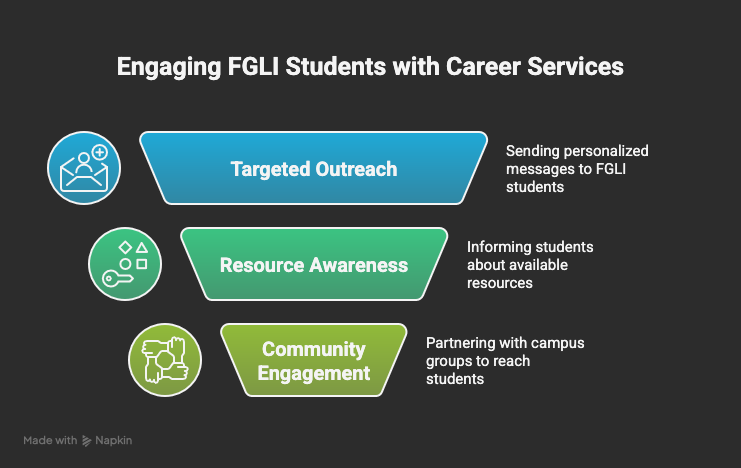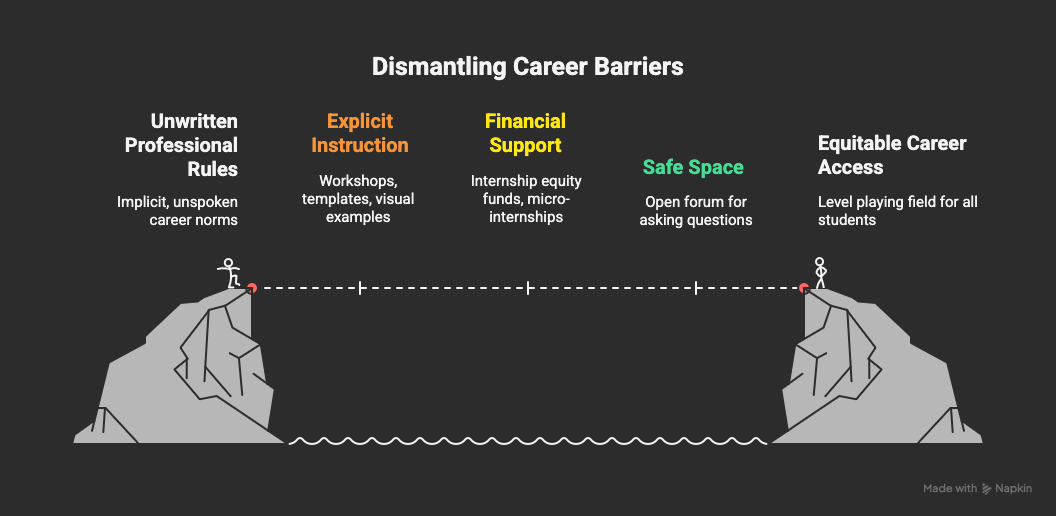How can Career Services close the equity gap for FGLI students?
Career Services can bridge equity gaps for First-Gen, Low-Income, and Diverse students by moving beyond one-size-fits-all programming. Proactive data-driven outreach, dismantling hidden professional norms, funding equitable internships, and shifting to an asset-based model all help level outcomes. The key is reframing support around strengths—resilience, adaptability, and self-leadership—while using technology to scale truly personalized guidance.
As a Career Services Professional (CSP), you're on the front lines of social mobility.
You know that First-Gen, Low-Income, and Diverse (FGLI) students are brilliant, resilient, and capable.
But you also know the data: they a lag behind their peers in post-graduation outcomes.
For instance, only 50% of first-generation students participate in internships, compared to 66% of their continuing-generation peers - a gap that directly impacts access to career opportunities and post-grad success.
The generic advice - "host a networking event," "offer resume reviews" isn't enough.
Why? Because it ignores the systemic barriers and the "hidden curriculum" that FGLI students face.
Let's move beyond the obvious and into actionable, data-backed strategies to truly level the playing field.
Why is supporting FGLI students a critical equity issue, not just a 'diversity' goal?
It’s about closing a tangible, persistent outcomes gap. FGLI students, even with similar GPAs, are less likely to get jobs that match their skills and aspirations.
This isn't a student deficit; it's a system failure.
Supporting this group is central to the mission of higher education.
First-generation students alone made up 25.5% of all respondents according to to the NACE 2024 Student Survey.
This is a massive segment, not a niche group.
Yet, the gap persists long after graduation. For instance, first-generation college graduates lag behind their peers on key economic outcomes, a finding that holds even years into their careers.
Analysis from the Pew Research Center's May 2021 report found that the median household wealth of first-generation college graduates is $152,000, compared to $244,500 for continuing-generation college graduates.
Also Read: How does counselor burnout reveal a career center system that’s no longer working?
How can we 'spot' FGLI students without making them feel singled out?
Stop waiting for them to walk in and start using data for proactive, targeted outreach.
Many FGLI students don't use career services because they don't know what they don't know, or they feel it's not "for them."
An article from FirstGen Forward notes that first-generation students "often navigate unfamiliar terrain, facing unique challenges that range from limited awareness of campus resources" to balancing other responsibilities.
You can't support students who aren't in the room.
To tackle this head on:
- Partner with Institutional Research (IR): IR and the Registrar's Office have data on who is Pell-eligible or self-identified as first-gen on their application.
- Segment Your Outreach: Instead of a generic "Welcome to the Career Center" email, send a targeted message: "As a first-generation student at [University Name], you have a unique and valuable perspective. We have resources designed to help you leverage that. Let's connect."
- Go to Them: Don't just hold events in your office. Partner with cultural centers, student-success programs (like TRIO or EOP), and introductory courses to deliver services where students already are.
Also Read: How to boost student attendance at career fairs?

What is the 'hidden curriculum,' and how do we dismantle it?
The "hidden curriculum" is the set of unwritten professional rules FGLI students often miss, like networking etiquette, salary negotiation (or even knowing you can negotiate), and "code-switching" for a corporate environment.
The single most effective strategy here is to make the implicit explicit. Never assume a student "just knows" a professional norm.
- Example: Don't just say "networking is key." Host a workshop titled, "Networking for People Who Hate Networking," and explicitly break down how to do it:"Here is an exact email template to request a 15-minute coffee chat.""Here are three questions to ask when you don't know what to talk about.""What does 'business casual' actually mean? Let's look at pictures."
- Real-World Program: The University of California, Berkeley's Career Center ran a "First-Gen Career Conference" that directly addresses these topics. A key takeaway was creating a "safe space" for students to ask questions they couldn't ask elsewhere, like "I don't know how to do this."
Also Read: What are the top 5 career services benchmarks every center must track?
How can we address the huge financial barrier to career-building?
Acknowledge that "just get an unpaid internship" is terrible advice for a student who needs to earn money. The inability to take an unpaid internship is one of the largest drivers of the experience gap.
The data is clear: paid interns outperform graduates who had unpaid internships or no internship at all, receiving more job offers before graduation, according to the NACE 2024 Student Survey Report.
This isn't about motivation; it's about money.
Actionable Steps:
- Create (or fiercely advocate for) an "Internship Equity Fund." This is a pool of money your institution uses to pay students for unpaid or low-paying internships.
- Promote "Micro-Internships": These are short-term, paid, professional projects. They are less of a time commitment and provide both a paycheck and a resume line.
Amherst College's Summer Internship Funding Program is a gold standard. It provides stipends of up to $5,000 for students, with financial aid recipients prioritized, turning an impossible choice into a viable career-building step.
Also Read: What are some good DEI outreach strategies for career centers?

How do we build trust and move beyond a 'deficit' mindset?
Shift your office's language and perspective from what FGLI students lack (e.g., "no connections," "unprofessional") to the unique assets they possess. This is the asset-based model.
FGLI students often have incredible resilience, cross-cultural communication skills, grit, and advanced time management from juggling school, work, and family. Your job is to help them articulate that as a professional strength.
- Deficit-Based Language: "You need to work on your soft skills and build a network from scratch."
- Asset-Based Language: "Your experience working 20 hours a week while managing a full course load shows exceptional time management and responsibility. Let's reframe that on your resume as 'project management' and 'stakeholder communication.'"
Stony Brook University launched a "Pathways to Employability" initiative. It's not a remedial program; it's a program to "equip first-generation and Pell-eligible college students with career-relevant experiential learning opportunities" and connect them with mentors, framing their journey as one of building, not fixing.
Also Read: How to improve FDS response rates?
Wrapping Up
By moving from a passive, one-size-fits-all model to a proactive, data-informed, and asset-based approach, you can stop being a resource for just the students who know how to use you and start being a catalyst for the students who need you most.
At Hiration, we help career centers make that shift.
Our Ethical AI platform is a full-stack career suite that supports every stage of student growth - from self-assessment and career exploration to resume, interview, and job matching.
It empowers counselors to deliver personalized, one-on-one support at scale while preserving the human core of career guidance.
If supporting FGLI students means more than offering access, explore how an integrated platform can help you reach those not yet in the room, personalize guidance through data, and measure the impact of true inclusion.
Closing the FGLI Equity Gap — FAQ
Why is supporting FGLI students an equity issue?
Because the gap in outcomes is structural, not individual. Even with similar GPAs, first-generation and low-income students face lower internship participation and long-term wealth disparities compared to peers.
How can Career Services identify FGLI students without stigma?
Collaborate with Institutional Research to access Pell or first-gen data, segment outreach by student group, and deliver programming through trusted spaces like TRIO or cultural centers instead of mass emails.
What is the “hidden curriculum,” and how can we address it?
It’s the set of unspoken professional norms—networking etiquette, self-advocacy, salary negotiation—that many FGLI students haven’t been exposed to. Break it down with transparent, skills-based workshops like “Networking for People Who Hate Networking.”
How can we help students overcome financial barriers to experience?
Create internship equity funds and promote paid micro-internships. Programs like Amherst College’s stipend model prove that financial aid-backed funding directly expands access to career-building opportunities.
What does an asset-based approach look like in practice?
It means shifting from “fixing deficits” to recognizing strengths. Highlight FGLI students’ resilience, adaptability, and leadership, and translate those into resume-ready, professional competencies.
How can AI and technology help scale equity initiatives?
Platforms like Hiration allow counselors to deliver personalized guidance—resume feedback, interview prep, and career exploration—at scale, ensuring underserved students receive equal access to tailored support.



